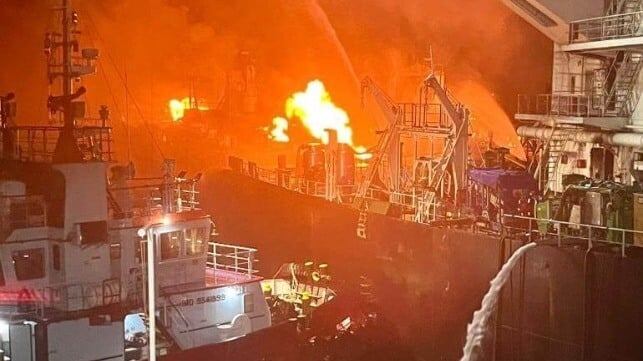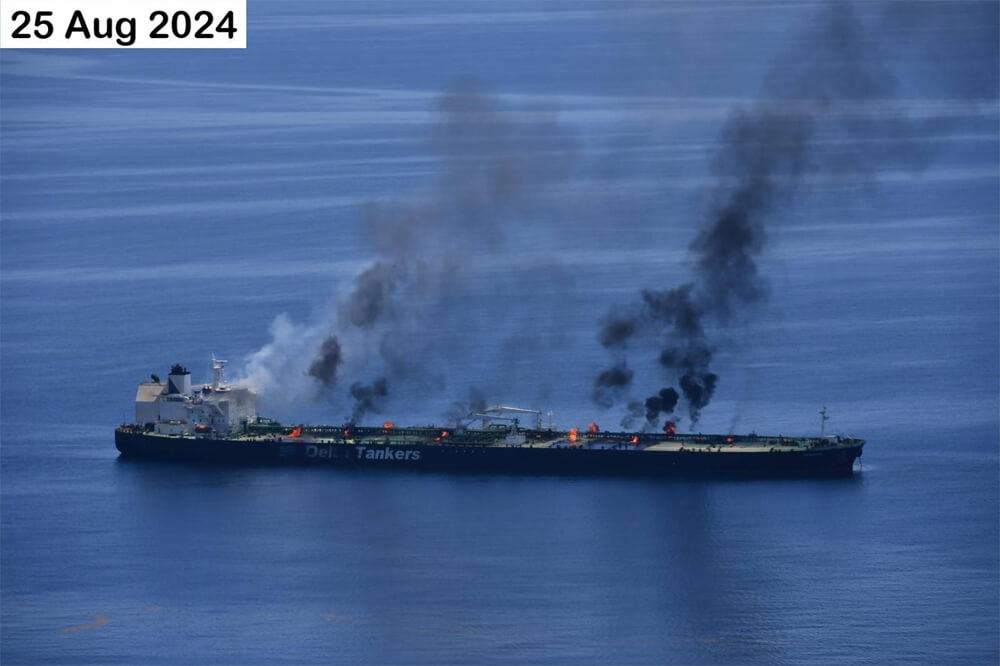Salvors Make Progress in Fighting Fires Aboard Burning Tanker in Red Sea

After a week of successful firefighting, the blaze aboard the tanker Sounion has been partially extinguished, according to the Combined Maritime Forces' Joint Maritime Information Center (JMIC).
Greek salvors began fighting the fire aboard Sounion on September 23, and have achieved "promising results," according to the JMIC. Some of the fires were under control on September 29, the last day included in the organization's update.
The vessel remains anchored about 40 nautical miles off the northern coast of Eritrea (17 08N 039 48E), and support vessels are on site to supply firefighting water and inert gas as the work continues.
Infrared satellite imaging shows that temperatures aboard the vessel remained elevated as of October 2, according to open source analysts.
Sounion was attacked by Yemen's Houthi rebel group three times on August 21, disabling the engine and leaving the ship adrift. After the crew abandoned ship, Houthi fighters returned to plant explosive charges on deck, starting multiple small fires that have burned for weeks.

Fires aboard the Sounion, August 25 (Operation Aspides)
The vessel was towed to its current safe location so that the salvage team could carry out the hazardous task of extinguishing the fires and reducing the risk of a catastrophic oil spill. The eventual plan is to transfer Sounion's cargo to another tanker for onward transport.
Houthi leaders have pledged not to interfere with the salvage mission, since the release of Sounion's cargo would lead to a spill larger than the Exxon Valdez disaster. The pollution would affect a large swathe of the Red Sea, likely including the Yemeni coastline and the subsistence fisheries that supply food for Houthi-controlled western Yemen.
The EU's Operation Aspides provided warship escorts during the towing operation and continues to protect the ongoing salvage mission. However, this operation has shown a limited ability to protect other vessels on the Red Sea shipping lanes: on Tuesday, the Houthis struck a tanker with a drone boat and hit a bulker with a missile, damaging both vessels.

that matters most
Get the latest maritime news delivered to your inbox daily.
According to maritime researcher Dr. Stavros Karamperidis of the University of Plymouth, Western nations have few available options to apply further pressure to halt the attacks on merchant shipping.
"The Houthis do not have to substantially escalate their activity to have a meaningful effect, and the absence of a ground threat to the bases of their power (unlike Hezbollah in Lebanon) limits the risk that any escalation poses to them. As such, the question of what a credible threat looks like is one that Western militaries and policymakers will have to contend with," wrote Dr. Karamperidis in a recent paper for RUSI.
